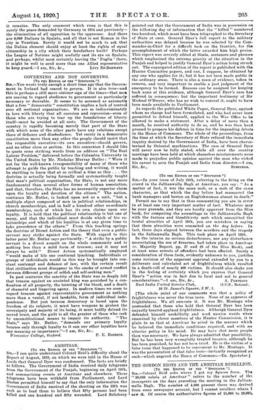GOVERNING AND NOT GOVERNING.
[To THE EDITOR OP THE " SPECTATOR."]
Snt,—You wrote truly enough a short time ago that the Govern- ment in Ireland had ceased to govern. It is also true—and this is perhaps a still more sinister sign of the times—that men are ceasing to regard obedience to government as particularly necessary or desirable. It seems to be assumed as axiomatie that a free " democratic " constitution implies a lack of control over all sectional organizations. We are so indiscriminately in love with liberty that all coercion and repression—even of those who are trying to tear up the foundations of liberty itself—must be avoided at all costs. The Government of the country is rapidly becoming merely that part of the State with which none of the other parts have any relations except those of defiance and disobedience. Yet surely in a democratic constitution more than any other the people should insist that the responsible executive—its own executive—should govern, and no other class or section. In this connexion I should like to quote some striking words from an address on "The Real Labour Problem," delivered before the Columbia University in tho United States by Mr. Nicholas Murray Butler : " Were it not for the well-known irresponsibility of many of those who attempt to guide the public by teaching and writing, it would be startling to learn that at so critical a time as this . . . the doctrine is actually being formally and systematically taught that man's political organization, the State, is not any more fundamental than several other forms of human association, and that, therefore, the State has no necessarily superior claim upon the loyalty and devotion of the citizen." The nation, continues Mr. Butler, is looked upon not as a unit, "but a multiple object composed of men in political relationships, in church memberships, and in half a hundred other co-ordinate memberships, each of which has its own claims upon our loyalty. It is held that the political relationship is but one of many, and that the individual must decide which of his re- lationships and which of his loyalties is at any given time to take precedence of the others." From this teaching springs the doctrine of Direct Action and the theory that even a public servant may strike against the State. With regard to this latter point Mr. Butler says pertinently : " A strike by a public servant is a direct assault on the whole community and is nothing less than a mild form of treason; and it may not always be mild." Direct Action systematically employed "would make of life one continual lynching. Individuals or groups of individuals would in this way be brought into con- stant contempt and defiance of law, with the certain result that civilization must disappear in the smoke of armed conflict between different groups of selfish and self-seeking men."
In past centuries the sanctity of the State was so deeply felt that treason against an anointed king was punished by a con- fiscation of all property, the tainting of the blood, and a death of shameful and lingering agony. In modern times we seem to regard treason against representative government as nothing more than a venial, if not laudable, form of individual inde- pendence. But just because democracy is based upon the freedom of its subjects, it must have weapons to piotect the sovereignty and majesty of its being, it must boldly defend its sacred trust, and the guilt is all the greater of those who seek by unconstitutional means to impair its authority. " The State," says Mr. Butler, "demands our primary loyalty because only through loyalty to it can our other loyalties have any meaning or importance."—I am, Sir, &c.,


































 Previous page
Previous page